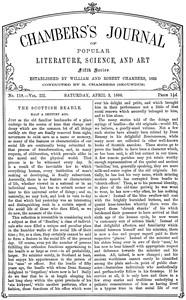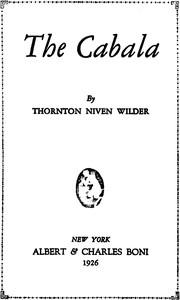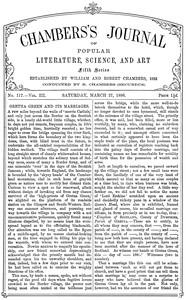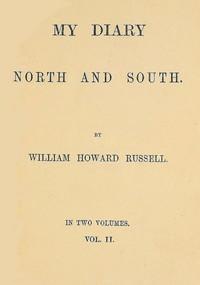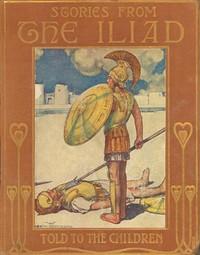|
|
Read this ebook for free! No credit card needed, absolutely nothing to pay.Words: 20402 in 5 pages
This is an ebook sharing website. You can read the uploaded ebooks for free here. No credit cards needed, nothing to pay. If you want to own a digital copy of the ebook, or want to read offline with your favorite ebook-reader, then you can choose to buy and download the ebook.

: Chambers's Journal of Popular Literature Science and Art fifth series no. 118 vol. III April 3 1886 by Various - Periodicals@FreeBooksThu 08 Jun, 2023 THE SCOTTISH BEADLE. HALF A CENTURY AGO. Just as the old familiar landmarks of a place undergo in the course of time that change and decay which are the common lot of all things earthly ere they are finally removed from sight, nevermore to exist save as a name or memory, so many of the features or characteristics of our social life are continually being submitted to that process of transformation, and, in many respects, of obliteration, which prevails alike in the moral and the physical world. That process is to be witnessed every day. It is a result of the inevitable law to which everything human, every institution of man's making or developing, is finally subservient. Assuredly, there is no feature or characteristic of life, whether viewed in a national or in an individual sense, but has to submit sooner or later to this universal order of things; and so, naturally, we may look, and look in vain to-day for that which but yesterday was an interesting and distinguishing trait in a certain aspect of the social life of those who then filled, as we do now, the measure of the time. This reflection is irresistible in considering such a subject as that of 'Beadles,' a class of individuals who once filled a unique and peculiar place in the humbler walks of the social life of their time; for, as a class, they certainly cannot be said to form a feature in the social life of the present day. Of course, even yet the number of persons fulfilling the orthodox functions appertaining to the beadle is as large as ever--in all probability, larger. No minister surely, in Scotland at least, but enjoys his appurtenance in the person of his 'man' or officer. But the beadle of fifty years ago, the beadle with whom Dean Ramsay delighted to 'forgather,' where now is he? Sadly do we fear that he is at length sleeping his last long sleep within the quiet precincts of his 'ain kirkyard,' while another performs, after a fashion, those functions of his office which were ever his delight and pride, and which brought him in their performance not a little of that social renown which assuredly belonged to him, and to him alone. Perhaps the time when the beadle flourished at his best and attracted to himself most of that social renown which made him a personage of no little importance--in rural districts at anyrate--was from half a century to a century ago. Of course many persons will yet vividly remember certain beadles of their acquaintance who were extant even within a decade or two ago, and enjoying in the flesh all that 'pride of place' to which their connection with ecclesiastical affairs had elevated them. Indeed, not a few may yet be living in various parts of the country who may not unworthily claim to share in that peculiar notorious regard which so many of their predecessors in office enjoyed; but it is to be feared that even they are every year becoming more and more a minus quantity, and the time is all but come, if it has not already come, when, so far as their social popularity as a class of characteristic individuals is concerned, they will soon, like the flowers of the forest, be 'a' wede away.' Half a century ago or so, however, it was a poor country parish that had not within its confines some entertaining worthy in the person of the beadle; for where the parishioners lacked entertainment, whether of a social or a graver kind, in the efforts of their clergy, which, indeed, was rarely the case, then they were almost certain to obtain it in some form or other in the sayings and doings of the inferior but not less interesting functionaries, their beadles. In not a few places, the popularity of the latter far eclipsed that of the former: a fact which was once at least ludicrously emphasised by the story of the very jovial beadle who excused his too frequent indulgences in strong drink--a propensity which had merited the repeated rebukes of his minister, who naturally enough quoted his own sobriety as an example--on the ground of the greater popularity he enjoyed, and to which the minister could not, he declared, make anything like the same claim. The office of beadle was frequently, in many country parishes, combined with that of sexton or gravedigger--an office which afforded considerable scope for the display of those pathetic, if oftentimes grotesque, traits of character. We remember one worthy who considered the latter office of much more interest and importance than the former. 'As beadle he only waited on the living; but as sexton and gravedigger, he waited on the dead!' Another worthy used to say that for performing the duties of beadle he only got the 'session's siller;' while for assisting at those more solemn and sad burial-rites, he got the 'deid's perquisites!' Apropos of the sexton-beadle, the writer lately heard an excellent story--which has never before been printed--regarding Thomas Carlyle and a late beadle of Ecclefechan. In the churchyard, which has now been made famous by the fact that it contains the mortal remains of the great sage, there stood, and still stands, a very old and dilapidated tombstone, on which are engraven some illegible hieroglyphics, which the beadle pretended to decipher, translating their purport in such a way as to reflect very flatteringly on the moral and social qualities of the persons--his ancestors--to whom they referred. On one occasion, when Carlyle visited this place of the dead, the beadle showed him round, but first of all pointed to this mysterious stone, underneath which reposed all that was mortal of the beadle's supposed illustrious ancestors, and dilated with his well-known exaggeration on the very high characters which, according to the hieroglyphics of the stone, they bore when in the flesh. Carlyle, knowing the beadle's soft point with regard to his 'forebears,' listened for a time in silence to the glowing description of individuals who never had had any existence save in imagination, and at length quietly remarked as he passed on: 'Puir cratur, ye'll sune be gathered to them yersel'!' The social popularity which many beadles enjoyed not unfrequently encouraged them to take certain liberties, which, nowadays at all events, would not be permitted either within or without the 'sphere' in which they lived and worked. What would be thought of a beadle, for instance, who would presume to correct the precentor in announcing from his box a proclamation of marriage between parties, as once did a beadle of a parish near Arbroath? The precentor had somehow been provided with a 'proclaiming' paper, in which the name of one of the parties had been wrongly stated, as the beadle supposed; and as the precentor duly proceeded to make the announcement that 'there was a solemn purpose of marriage between Alexander Spink of Fisher's Loan and Elspeth Hackett of Burn Wynd,' he was unceremoniously interrupted by the beadle suddenly exclaiming: 'That's wrang, that's wrang! It's no Sanders Spink o' Fisher's Loan that's gaun to marry Elspeth Hackett, but Lang Sanders Spink o' Smithy Croft!' The story of Watty Tinlin, the half-crazy beadle of Hawick parish, is another proof of this license, which was, on certain occasions, supposed to be due to his office. One day Wat got so tired of listening to the long sermon of a strange minister, that he went outside the church, and wandering in the direction of the river Teviot, saw the worshippers from the adjoining parish of Wilton grossing the bridge on their way home. Returning to the church and finding the preacher still thundering away, he shouted out, to the astonishment and relief of the exhausted congregation: 'Say amen, sir; say amen! Wulton's kirk's comin' ower Teyit Brig!' Such conduct on a Sunday in the present year of grace, if it did not relegate the offender to the police cell, would at anyrate result in a very solemn and serious sitting of the 'session' on the following Monday. But the times are changed; and not only have beadles, but ministers and churches, too, changed with them; and the living embodiments of the class whose peculiar and, on the whole, not unpleasant idiosyncrasies of character and 'calling' we have thus briefly indicated, are now few and far between. IN ALL SHADES. BY GRANT ALLEN, Free books android app tbrJar TBR JAR Read Free books online gutenberg More posts by @FreeBooks
: The Cabala by Wilder Thornton - Upper class Fiction; Rome (Italy) Social life and customs 20th century Fiction; Americans Italy Fiction@FreeBooksThu 08 Jun, 2023

: Chambers's Journal of Popular Literature Science and Art fifth series no. 117 vol. III March 27 1886 by Various - Periodicals@FreeBooksThu 08 Jun, 2023
|
Terms of Use Stock Market News! © gutenberg.org.in2025 All Rights reserved.

